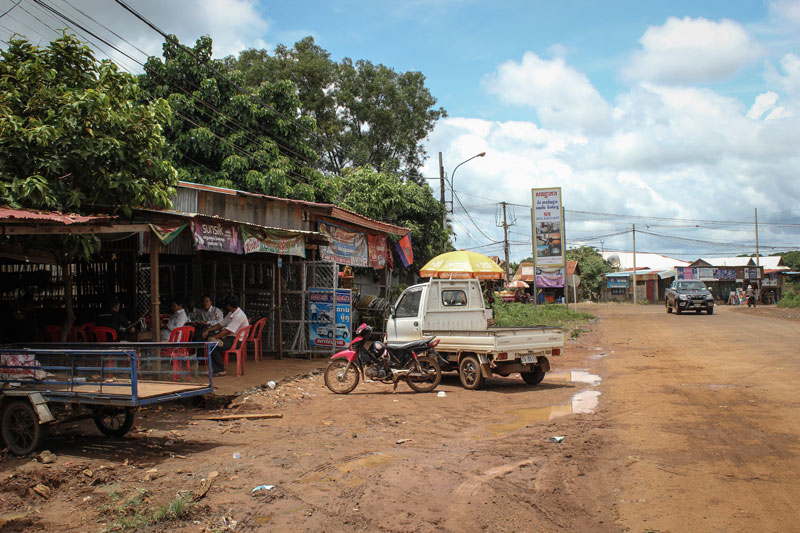BANLUNG CITY, Ratanakkiri province – At a nondescript coffee shop along a well-worn road on the northern edge of this provincial town, journalists gather and wait.
One cuts and files his fingernails, some smoke cigarettes, they all drink coffee and tell jokes.

“He lives in the forest, so why is he so busy?” one of the scribes remarked as a white Lexus SUV sped by, its passenger, a senator, holding a phone to his ear.
Although they appeared fixated on the Floyd Mayweather, Jr. title fight unfolding on the flat-screen TV, the journalists of Banlung City keep their minds on the traffic.
As loggers tear down Ratanakkiri’s lush forests with speed and impunity, reporters come together on this relatively quiet road—linking the abundant north with the O’Yadaw border checkpoint, where much of the prized wood disappears into Vietnam—and wait for timber smugglers to drive by.
“We chase the trucks and film them so we have evidence,” said Tep Sothy, a reporter for SEA TV, explaining that they then contact provincial officials for confirmation of who the cargo belongs to and whether it is legal or not.
“When it is a sensitive issue, [the governor] has never responded to our questions,” said TV3 reporter Phal Dam, alleging that a system of patronage linked the transport of timber to some provincial officials.
“We have reported a lot in relation to timber smuggling. Authorities are narrow minded,” he said.
In May, some 30 reporters from across Ratanakkiri were called to the provincial office and told by deputy governor Nhem Sam Oeun to stop gathering at coffee shops around the city because it was “not a good look.”
Mr. Sam Oeun said that some reporters “act like a police force” and “have no details when they broadcast their news.”
Last month, 32 reporters thumb-printed a complaint after provincial governor Thorng Savun sent a letter accusing them of extortion.
“I see that the journalists every day seem to take crimes and turn them into careers—such as with logging,” he wrote. “If they [drivers] do not pay, they publish it.”
Contacted by telephone Monday, the governor said he was putting together a complaint to forward to Phnom Penh.
“We are gathering evidence and will report to the Ministry of Information,” he said, declining to outline what the report would contain.
As Mayweather ducked and weaved his way to victory on Sunday, the eight journalists at the unnamed coffee shop groaned at his tactics—“he just keeps running”—and at suggestions that they were simply tracking illegal loggers for their own benefit.
“We never demand bribes,” Mr. Sothy said. “We only follow the trucks and shoot the timber for broadcasting.”
They work in groups for efficiency and for safety, he said. In August, three were locked inside the Forestry Administration office after going there to gather evidence of illegal logging. In 2012, Hang Serei Odom, who reported on forest crimes for a little-known newspaper, was found murdered in the trunk of his car.
“The killer of the journalist has never been arrested, and that is worrying,” Mr. Sothy said.
So, at about 8 a.m. each morning —barring rains or haze that would hinder timber transporters—they come together at the coffee shop and wait for tips from sources they furnish with phone cards along the roads to the north.
And they don’t just focus on loggers. “When villagers have land disputes and want to meet reporters, they can find us easily,” said Phuong Phon, a reporter from the Phnom Penh Daily.
The journalists said the coffee shop—with its red plastic chairs, timber tables and endless supply of cheap coffee and free tea—is like their office. And they won’t be ceasing their gatherings any time soon.
Contacted Monday, Mr. Sam Oeun, the deputy governor, said that there had been no official action taken against the reporters, but he again labeled them an eyesore.
“There is no measure against them but they should move to other places because it affects the image of the province—there are tourists and other people there,” he said of the street on the city’s edge.
Mr. Sam Oeun denied that authorities were involved in the destruction of the forests or the lucrative trade of luxury timber.
However, Mr. Dam, the TV3 reporter, said that journalists had only drawn the ire of authorities after disrupting their illicit income.
“Our reporting of timber smuggling has affected the underlings of some authorities because their men are in the timber business,” he said. “That is why they are so angry.”